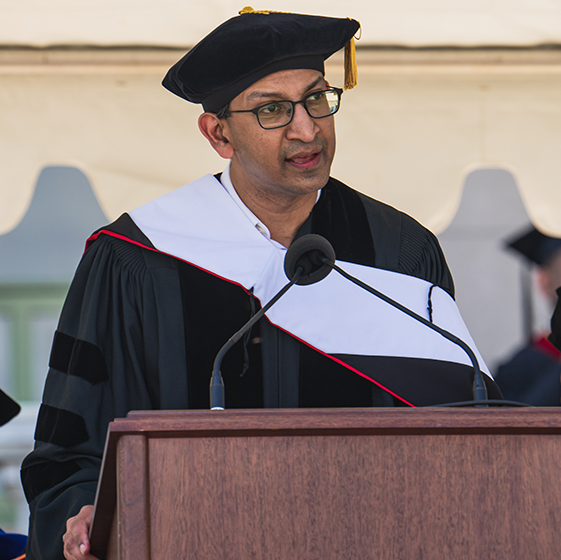Raj Chetty awarded honorary doctorate by Wesleyan University

Noted Indian American economist Raj Chetty has been awarded an Honorary Doctor of Humane Letters by Wesleyan University, a private liberal arts university in Middletown, Connecticut.
In his speech to the Class of 2024 at the university’s 192nd Commencement ceremony on Sunday, he cited his research into opportunity disparity’s effect on social mobility, praising Wesleyan for being a leader in expanding access to higher education.
“When a child moves to a neighborhood with better schools or gets a chance to attend a high-quality college, we see their lives transformed relative to other comparable kids who didn’t get the same chances,” Chetty said. “Opportunity matters. And education is one of the keys that opens the doors of opportunity.”
Devoting his “life to studying how we can create better opportunities for everyone in society to thrive, no matter their background,” Chetty said, “What I’ve found is that education remains the surest pathway to a better life, based both on my personal experience and my research.”
“When my mother was graduating from high school back in the 1950s in a small town in South India, there were no colleges nearby,” he recalled. “At that time, it was rare for women to get a higher education, and unheard of for women to move to another city to go to college.”
“The year before my mother graduated, a wealthy businessman decided to open the first women’s college in my mom’s hometown,” he said. “My mom attended that college, went on to medical school, and completed her residency at the University of Wisconsin–Madison, the first woman to become a doctor in her community in South India.”
“My father likewise grew up in a low-income family in South India and applied for scholarships to attend universities in the US,” Chetty said. “He was lucky to receive a scholarship to do a PhD at UW–Madison, without which he would not have come to the United States or pursued graduate studies.”
“The effects of those educational opportunities have cascaded through the generations in our family,” Chetty said Sharing “100 million stories that back up that example.”
Over the past decade, Chetty said his research team at Harvard, Opportunity Insights, has analyzed anonymized data from tax returns, social media, and other sources on over 100 million Americans.
“We have found that people’s chances are shaped by the environments in which they grow up,” he said. “When a child moves to a neighborhood with better schools or gets a chance to attend a high-quality college, we see their lives transformed relative to other comparable kids who didn’t get the same chances.”
“Opportunity matters. And education is one of the keys that opens the doors of opportunity” Chetty said lamenting, “Unfortunately, access to those opportunities is not evenly distributed. There are numerous talented kids in America who don’t get the opportunity to attend high-quality schools and colleges.”
Chetty said their research shows that “efforts to expand access to opportunity—when implemented on scale across colleges and other institutions in America—can make the American Dream of upward mobility more of a reality for everyone.”
He challenged the students “to build on this example and make the world a better, fairer place by using your education to inspire and spread opportunity to those around you.”
Chetty is the William A. Ackman Professor of Public Economics at Harvard University. He is also the director of Opportunity Insights, which uses “big data” to understand how we can give children from disadvantaged backgrounds better chances of succeeding.
His work on topics ranging from tax policy and unemployment insurance to education and affordable housing has been widely cited in academia, media outlets, and congressional testimony.
Chetty received his PhD from Harvard University in 2003 and is one of the youngest tenured professors in Harvard’s history. He has received numerous awards for his research, including a MacArthur “Genius” Fellowship and the John Bates Clark medal, given to the economist under 40 whose work is judged to have made the most significant contribution to the field.

